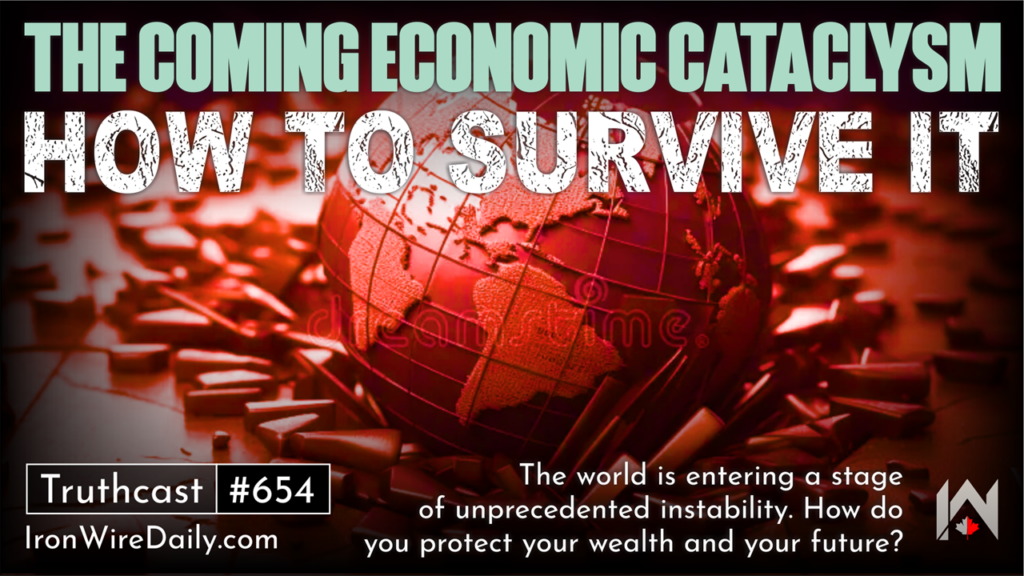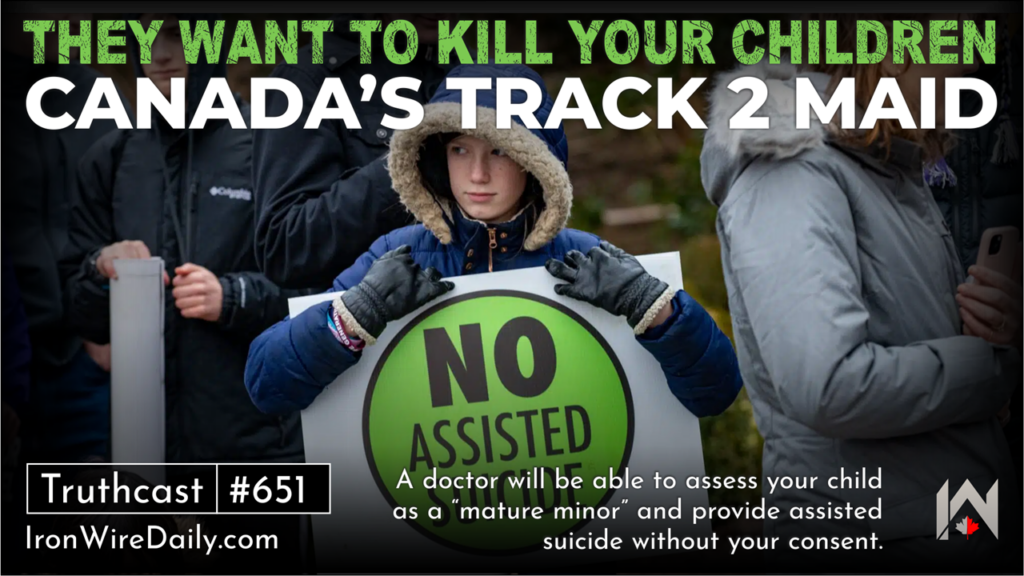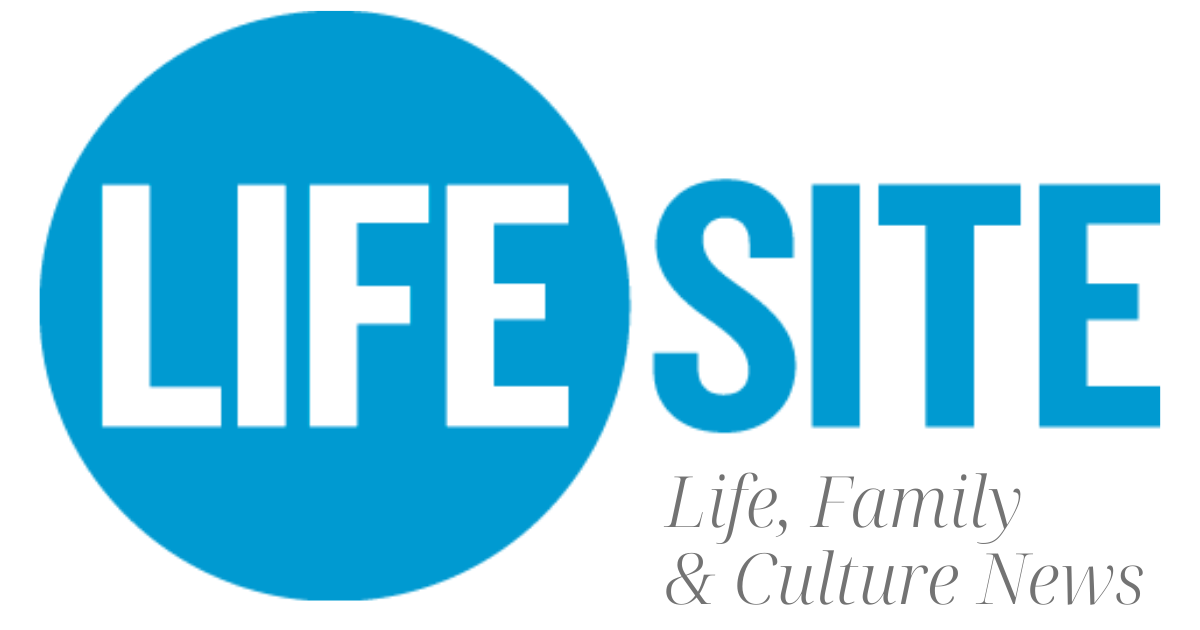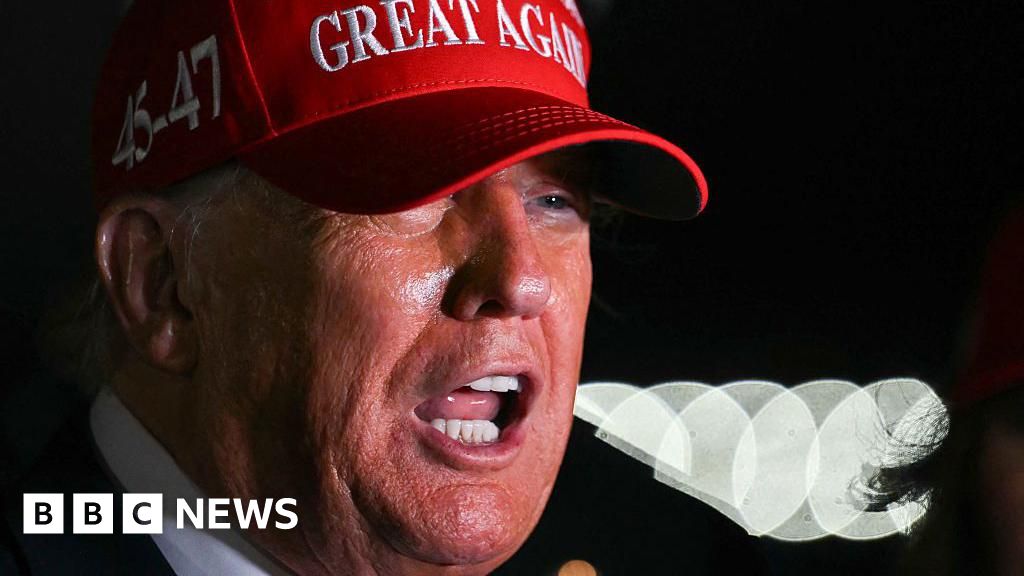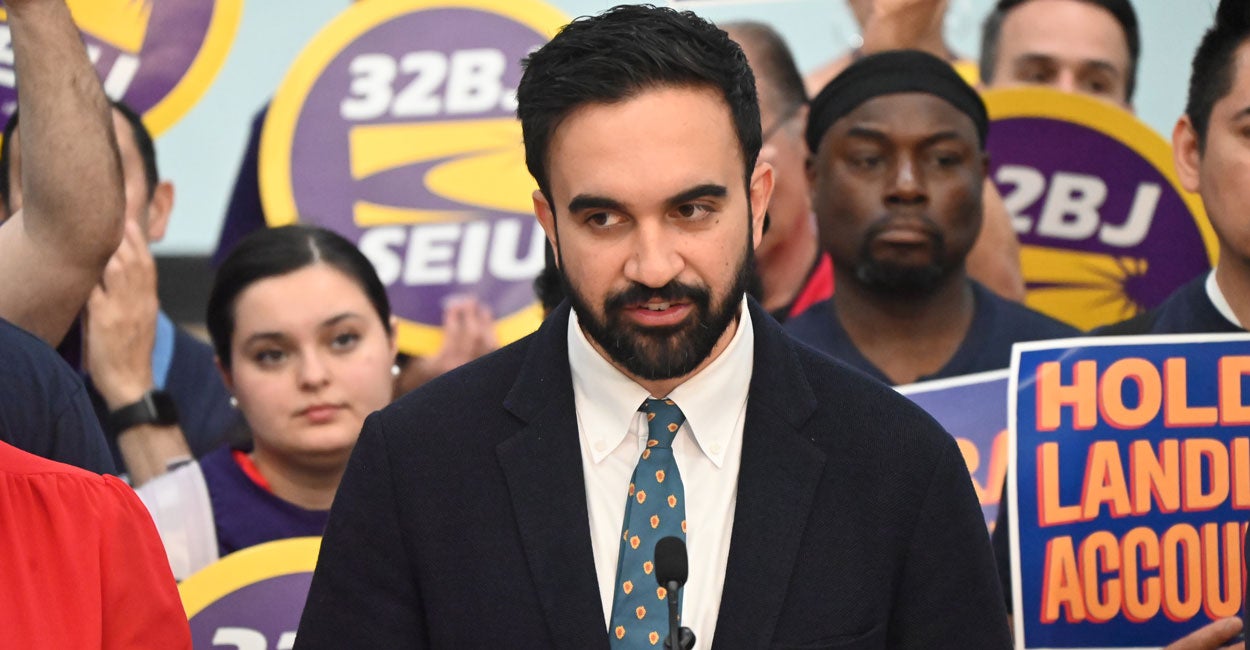(0:00 - 0:27)
Sharyl Attkisson is one of the world's top investigative journalists. She worked with CNN as a reporter and anchor for seven years, then with CBS as an investigative journalist for over 20 years, before leaving in 2014 when the network began suppressing her reporting. Sharyl is a five-time Emmy Award winner, as well as a recipient of the Edward R. Murrow Award for investigative journalism.
(0:27 - 0:55)
She is also the author of several books, most recently, Follow the Science: How Big Pharma Misleads, Obscures, and Prevails. I contacted Sharyl for this interview after reading her book and her recent blog post, 100 Health Priorities for the Nation in 2025. While written from an American perspective, Sharyl's insights are just as relevant to us here in Canada, and perhaps even more so.
(0:55 - 1:24)
In this interview, Sharyl exposes the many ways in which big pharma influences policy, the media, and public perception. But more importantly, she suggests practical solutions for fixing our healthcare systems so they can once again serve the health of the people, and not the bottom line of pharmaceutical companies. Sharyl, welcome to the show.
(1:25 - 1:37)
Thank you. And I appreciate your time so much today, Sharyl. We were talking just before the interview that I'm a little bit humbled to be interviewing you because you have decades of experience as an investigative journalist, and I've only been doing this for a few years.
(1:37 - 1:58)
But I read, first contacted you in regards to your post, 100 Health Priorities for the Nation in 2025, which really focuses on solutions. But also, I recently read your book, Follow the Science: How Big Pharma Misleads, Obscures, and Prevails. And once again, as an investigative journalist, you raised some things that even I hadn't known about.
(1:58 - 2:33)
And I'd kind of like to start at the beginning of the book as sort of a framework, because there were two major events that sort of led you to where you are now, and having read that book and done all of this. And that was the vaccines, the smallpox vaccines in the military, which killed a friend of yours, and the horrific baby oxygen study. Could you talk about those, please? Well, I just wanted people to understand that I didn't come into the issue of covering medical health scandals as someone that just doesn't believe anything and doesn't believe anybody.
(2:33 - 2:40)
I was like most people out there, trusted the medical establishment. My daughter got all her vaccines. There was no skepticism on my part.
(2:41 - 3:03)
Probably it deserved a bit more than I had because I'm a journalist, but it just never occurred to me that studies would be wrong, and doctors wouldn't tell the truth, and scientists would do unethical things. So in the book, I've selected some of the true life accounts of the things that took me down this path of understanding what really goes on. And it began around after the 9-11 attacks in 2001.
(3:04 - 3:32)
CBS News assigned me as an investigative journalist to cover the restart of the smallpox vaccine program, which was the thought that now there could be a biological weapons attack using smallpox because the terrorists were, you know, out to get us. And the vaccine itself can be problematic even more so than other vaccines. So they had stopped giving that routinely because the risks had not been considered big enough to validate or to have a reason to use the vaccine.
(3:32 - 3:49)
Now, all of a sudden, they're like, yes, we want to use the smallpox vaccine. I learned pretty quickly to my surprise about all kinds of side effects and adverse events that can happen with smallpox vaccine and came to learn other vaccines too. But I just remember that was an eye-opener to me.
(3:49 - 4:14)
I didn't understand the biological mechanisms about a vaccine that could give you blood clots and myocarditis, problems with your heart, and so on. But pretty early on, they had a very aggressive program in the government to follow the people getting the smallpox vaccine under this restart. They were going to start with military and first responders first, but they wanted to carefully monitor their health to see if there were adverse events and reactions.
(4:14 - 4:26)
And there were. And unfortunately, some of them were among the military. And one of them was an NBC journalist, David Bloom, a colleague of mine who was embedded with the army at the time covering Iraq.
(4:26 - 4:32)
And he died of a blood clot. Some people may recall this, even though it was quite a while ago. It made huge headlines.
(4:33 - 4:56)
And I was already covering the smallpox restart. And I understood that, A, his death as someone who would have received the smallpox vaccine to be embedded with the military, with a mandatory report for this database that was going to track any death or adverse event that happened after smallpox vaccine to see if there's a connection to the vaccine. So I knew he had to be reported.
(4:56 - 5:05)
And I knew that that was the first question that really should be asked. But nobody was asking it. And I started thinking, I wasn't even a medical health reporter.
(5:05 - 5:20)
Just an investigative journalist. I'm asking these questions. Come to find out his death had not been properly reported by either the civilian authorities, because he was a civilian, or the military authorities who he was traveling and embedded with.
(5:20 - 5:42)
So I saw that as a cover up, first of all, because they knew better. And second of all, I think it was just important people understood what the vaccine could do, as I was learning as well. Ultimately, I broke the story that his death had not been properly reported, that it could potentially be linked to the smallpox and slash anthrax vaccine, because you get more than one when you're in the military.
(5:43 - 6:00)
And as a result of my reporting, his death was reported. And ultimately, because of other civilian injuries and deaths, the smallpox vaccine restart program was halted. They did away with it because they decided the risk of the vaccine outweighed the risk of the biological weapon.
(6:01 - 6:30)
Again, a huge eye opener for me. And I remember asking someone as I was learning about vaccines, one of the scientists who was a source of mine in the government, for the first time I said to him and to myself, what about childhood vaccines? Like, if occasionally a vaccine can cause these problems and someone can drop dead, a healthy, you know, young, relatively young person, what happens when sometimes you give these to babies? And the person said to me, I'm not touching that third rail. I'm not going there.
(6:31 - 6:48)
I even know it was a controversy. But that really got the wheel spinning in my mind. And it was something that kind of shocked me because you, when you went to cover the stories with the military, you showed up with your vaccine card and they ignored it and jabbed you again.
(6:49 - 7:34)
And so what that leads me to wonder about, and I don't know if you have any information on this, but if this is what they're doing to the military, giving the, and we've already, something might discuss later on in the interview, is the effect of being given a whole bunch of vaccines at the same time. The fact that the other thing you related in your story about the military vaccinations is that they're often not telling you what they're injecting you with. How much could this be contributing to making the military less effective by causing illnesses and reactions and health problems with their soldiers? Well, you know, they would argue that it would be worse for them to go to these foreign countries and face these, you know, potential viruses that they're not protected against.
(7:35 - 7:52)
But I think the other side of this coin is to argue that a lot of them are being farmed, sometimes in chronic ways that are not easily measured in the short term. I mean, sometimes, yes, it's catastrophic. I covered the case of the poor soldier, Rachel Lacey, who dropped dead after her multiple vaccines in, I believe it was in boot camp.
(7:53 - 8:04)
A recommendation came from that that you shouldn't give all the vaccines at once. But to my knowledge, they still do. You know, they were saying you can spread those out by weeks and weeks because everybody knows side effects can be worse when you give them together.
(8:05 - 8:26)
But I feel like there really wasn't the recognition in the military. They just seemed tied in with the vaccine industry at high levels. I learned that at Walter Reed Army Medical Center, there was a whole ward, a whole floor that was just vaccine injured for soldiers that if they could get there, because usually they were accused of malingering and ignored.
(8:27 - 8:40)
And sometimes just ejected from the military when they got sick from vaccines. But occasionally, if they had enough documentation and someone who would listen, they ended up in this ward at Walter Reed. And there was just a huge, you know, not enough beds for all of them that were having the reactions.
(8:41 - 8:52)
So, yes. And I think it probably contributes to what we consider post-traumatic stress disorder. They sometimes come out with concussive brain injuries from training and from bombs and so on.
(8:52 - 9:12)
But the vaccines that can cause brain injury as well, sometimes in a chronic sense, not just an acute one-time thing, I feel like that contributes to the overall picture. And yes, some of the soldiers knew what vaccines they got. But typically, the soldiers who were injured told me they could never tell because they would give them together.
(9:12 - 9:26)
They weren't told sometimes when they asked what they were being given. And I came to believe that was by design. If you gave one shot at a time, it would be a lot easier to say the flu shot caused this Guillain-Barre paralysis in this soldier, which happens.
(9:27 - 9:35)
But when you give them all at once, it's hard to say which one did it. It's hard to say, you know, if it was related. I just feel like it's easier to brush it under the rug.
(9:36 - 9:55)
So, yes, when I was working for CBS News, they required us to stay updated on a battery of vaccines, including some unusual ones that aren't typically given in the States. So that if we had to, on a moment's notice, travel with the military, we were ready. So I had all my vaccines and my little, like you said, my little yellow card that proved everything.
(9:56 - 10:12)
And twice when I showed up for missions, they didn't even look at the card. I just got more shots. And years later, after a battery of shots, and I spontaneously lost my sense of taste, and that lasted for about five years, by the way, never would have connected it to vaccines.
(10:12 - 10:25)
I didn't understand what they caused back then. I had a doctor that asked me what vaccines I'd had. And so I did go to the military and I said on this date, you know, you guys didn't tell me what you were giving me, but here's what happened.
(10:25 - 10:36)
And they said, well, we don't have any records. So how do you not keep records of what you're injecting into people? But I feel like that's all part of the plan, really. Yes.
(10:36 - 10:58)
Now, everything we've just been talking about is relevant to informed consent. And I want you to talk about your ideas for fixing that. But before we do, I also wanted you to talk about this horrific baby oxygen study, which I don't know if a person could read it any other way than I did, of these researchers did this knowing they were going to kill babies doing it.
(10:59 - 11:38)
It's horrific. Well, they would just, just so to cover ourselves, they would say no, you know, they would say they didn't do anything like that on purpose. But what happened is, prestigious research institutions here in the United States, some of the most prestigious hospitals and so on, used federal money in a federal study to enroll a whole bunch of premature, extremely premature babies into a controversial study, which mothers, most of them single African-American women, say they were pressured into signing a consent form, but not told in most cases that they were even entering their babies in a study.
(11:38 - 11:44)
They were told, oh, this will help your premature baby. You want to help your premature baby? And they'd say yes. They'd sign something.
(11:45 - 12:04)
Well, they had consented to letting their babies take part in an experiment that was not to the benefit of any of the babies, which is a problem with a lot of research, by the way. It's to benefit future people and future babies, but it's not necessarily going to help, and it may hurt the people in the study. So how do you get people to volunteer for that? Well, a lot of times they just don't tell the truth.
(12:04 - 12:13)
And that allegedly happened with this study. Babies died as a result. They were randomized into either a high oxygen group or a low oxygen group.
(12:13 - 12:38)
Premature babies are usually put on oxygen. Usually the oxygen is switched around for the baby's needs as they change. But in this case, and this wasn't even the consent form, even if the parents had read it and understood it was a study, the oxygen monitors were rigged to give false readings of oxygen so that the people caring for the babies in the hospital would not be tempted to adjust the baby's oxygen for their own good.
(12:39 - 12:53)
They would be left in their randomized, as someone put it, sort of like the roll of a dice. They would be left into the range that had been decided they would stay in for their study regardless of what they needed. So too much oxygen can cause problems.
(12:53 - 13:00)
Too little oxygen can cause problems. I believe too much causes vision problems and blindness. Too little can cause death.
(13:00 - 13:22)
They're trying to find a sweet spot, but as a result, some babies were blinded and some babies died. And long story short, an ethics body for the government that's supposed to look at this sort of thing got alerted to it, that this was a huge violation of the consent forms and so on. So instead of fixing it, I think this is where outrage is built upon outrage.
(13:23 - 13:31)
The medical establishment comes down on the ethics body and says, you're out of line. You better retract your findings. They start publishing in medical journals.
(13:32 - 13:48)
He got spanked down. I never heard from him again. He originally did an interview with me, but he got so spanked down that I think for the next X years, he just laid low in that position and did hardly anything because he found no support among the people he'd need to have support for to take some sort of enforcement action.
(13:48 - 14:00)
So that's just one horrific case. And I'll tie that to today because back then, they did hold a big seminar about kind of what went wrong, what should be changed. This is maybe 10 years ago.
(14:00 - 14:30)
And I attended that and I was shocked to hear half the researchers who spoke at the seminar said, well, you know, we really need to loosen up informed consent. Like the whole problem here was that they didn't give informed consent. But here they're arguing, well, why should we have to give informed consent? Who would want to be taking part in these studies if we told them all of these things? And how are we going to serve the greater good if we can't get people in our studies? I'm like, what? So fast forward to today.
(14:30 - 15:06)
In the past year, actually, now that we're in 2025, I believe it was in late 2023, Congress slash the government, I'm sure at the behest of the pharmaceutical industry, passed a law that for the first time in this country, loosened informed consent and gave those researchers the wish that they'd been wishing for for over a decade, something they've been pushing for. Believe it or not, now in our country, I'm not sure what your rules are. Here, if the researcher decides that the risks of the study are minimal, just like the baby oxygen study, you know, researchers would have claimed, they don't have to even tell you about them.
(15:06 - 15:29)
So now you can enroll in a study and the researcher would have decided, I don't got to tell them anything because I don't think there's very much risk. Problem is, as you see in the book, Follow the Science, many times researchers have lied or been mistaken in their judgments of these things. So it's just shocking to me that we've quietly loosened the rules and I would never consent personally to be in a study under the current conditions.
(15:30 - 15:48)
There is a major stock market crash coming that will rival the crash of 1929. But there is a way to not only protect your wealth, but profit in the coming crash. The stock market chart today looks exactly like the charts prior to October, 1929.
(15:48 - 16:07)
Banks are disastrously over leveraged and several major US banks have already failed. And the CDIC, the Canada Deposit Insurance Corporation, doesn't have nearly enough money to cover depositors. If you have money in the stock market, it is time to get out.
(16:08 - 16:33)
Governments and corporations around the world are buying up precious metals in record amounts because they know the coming crash will make their other assets nearly worthless. You can buy precious metals at wholesale prices through New World Precious Metals at premiums substantially below other Canadian brokerages. And you can even transfer savings in your RRSP tax-free.
(16:34 - 16:54)
To get more information, use the link below this video to contact New World Precious Metals. They will answer any questions you may have. You may also wish to contact Adrian Spitters, a personal financial consultant who successfully predicted the stock market crashes of 2000 and 2008.
(16:54 - 17:28)
You will find Adrian's contact information below as well. Finally, if you want more information on the coming crash and what you can do to protect yourself, your family, and your assets, see my most recent quarterly update with my team of financial experts at ironworeport.com. By clicking the link below to contact New World Precious Metals, you will also be helping to support our efforts to bring Canadians to truth as we are an approved affiliate partner. And not to mention that by default, if it's a study, they don't know the outcome.
(17:28 - 17:38)
Right, absolutely. Now, this gets us into, as I said, informed consent. And you made a number of suggestions in that post about how we can fix this.
(17:38 - 18:02)
And I don't think we even need to get into the COVID vaccines because I've covered that in depth in many other interviews about how people were not informed of the risks of those. So what are your ideas then, Sharyl, for how we could change the system to guarantee that people would be informed? Well, I think we have to go back. That was actually a law and then policy change that said we don't have to get informed consent anymore.
(18:02 - 18:21)
So that has to be changed back. But then even when it's changed back, if it's changed back, the researchers and the industry has to be held accountable when they don't follow it because they haven't followed it. And it's very rare that I found researchers taken to task where there's any punishment when they make the most egregious sorts of violations.
(18:21 - 18:46)
So something has to be done in terms of punishing or holding people accountable when they violate these rules. And I think there's a big role to be played by medical ethics groups and medical associations that unfortunately have been, I will say, bought out by the pharmaceutical industry. They should be stepping in and making sure standards are kept by the doctors and the people who have licenses to conduct research and so on.
(18:46 - 19:05)
So I think the whole industry needs to be told, you got to start doing your job and doing what people expect would be done for you to be able to do experiments on humans. There has to be informed consent. And then lastly, when you go to the doctor, I mean, I don't know about your experience, but I've taken a lot of people to the doctor and I've visited doctors.
(19:06 - 19:30)
I don't think I've ever been sat down and told for vaccines what the adverse events are, for drugs other than maybe a passing note, or if I asked what the side effects might be, that's supposed to be done for everybody on the front end. And, you know, I'm sorry if they think it's going to scare people away from using a medicine. If knowing the truth scares you away, you deserve to know the truth and be scared away.
(19:30 - 19:52)
But I don't think it will have that effect. I think when people have full information, it will simply make it where they watch more carefully if they may have an adverse event, they understand better if they shouldn't be on a particular medicine based on their own personal risk factors. I think it's actually helpful to the system and I don't think it harms ultimately the notion that, you know, like people would just won't take any medicine.
(19:52 - 20:06)
I don't think that happens, but I think we deserve regardless full information on what we're taking, what's being done to us. Yeah. And I had an idea when I was reading your points on that, that I wanted to run past you because it goes a little beyond what you were talking about.
(20:06 - 20:34)
My own past experience for a long time, I was a realtor and we ran into situations where the market was very hot and people would make unconditional offers and there were risks attached to that. And because I wanted to make sure that my clients understood the risks and that I was also covered, I actually took the initiative to draw up a sheet that listed those risks. I sat down with the client and went over with them saying, these are the risks you're taking on if you make an unconditional offer and I need a signature from you right here that says, I explained these risks to you.
(20:34 - 21:01)
Now that wasn't required in our industry at the time, but I took the extra step to do it. So when you start talking about informed consent and doctors and studies, what do you think of the idea that there should be a list, a printed list of all of the risks and there should be a space at the bottom for them to sign saying, this person or doctor or whatever explained all these risks to me, I understand them and I've decided I'm going to go ahead anyway. Do you think that would fix a lot of it? I think that's a great idea.
(21:01 - 21:21)
And by the way, that's supposed to happen or was supposed to happen with studies, a very explicit signed piece of paper. That's something that's also changed. Even if they decide they are going to give you risks or if the risks are significant and they have to disclose for a study, another change in the law says, basically they can chit chat with you.
(21:21 - 21:38)
You know, it's how I read it. They don't have to do the written thing anymore because I think they're afraid people will read that. And again, the argument is, well, how can we do research to benefit society if nobody volunteers? It's like, well, if nobody volunteers because you told them the truth, then they deserve to know the truth.
(21:38 - 21:52)
You have to find another way to do that research. But I think it's a good idea to get something explicit. And if you're like you or me for your own protection, you would want that because you don't want people coming back later saying they misunderstood or they didn't understand or that didn't happen.
(21:53 - 22:02)
So it's kind of a no brainer. And the reason that they don't do it would imply, you know, they're intentionally, they don't want a record. They don't want to give this explicit information.
(22:03 - 22:16)
Right. Now, the next area of your points I wanted to get into has to do with limiting the influence of big pharma. And I think one of the best illustrations of that was a story in your book about Aduhelm, the Alzheimer's medication.
(22:17 - 22:48)
Could you relate that story, please? Social media platforms promote content based upon how many likes, shares and follows they get. Please help us to spread the truth and take just a few moments to hit those like and follow buttons and then share this video to your own account. Truth is becoming ever harder to come by, but you can help spread the truth and it will cost you nothing except a few moments of your time.



